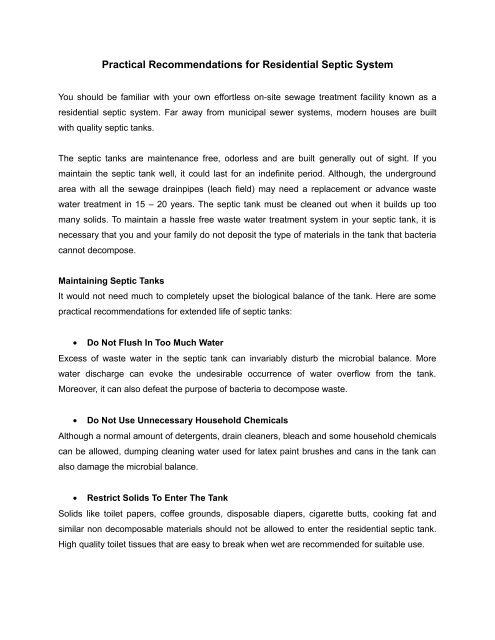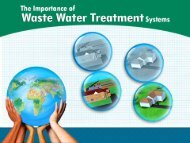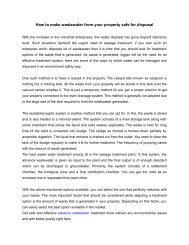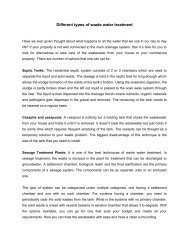Practical Recommendations for Residential Septic System
You should be familiar with your own effortless on-site sewage treatment facility known as a residential septic system. Far away from municipal sewer systems, modern houses are built with quality septic tanks.
You should be familiar with your own effortless on-site sewage treatment facility known as a residential septic system. Far away from municipal sewer systems, modern houses are built with quality septic tanks.
You also want an ePaper? Increase the reach of your titles
YUMPU automatically turns print PDFs into web optimized ePapers that Google loves.
<strong>Practical</strong> <strong>Recommendations</strong> <strong>for</strong> <strong>Residential</strong> <strong>Septic</strong> <strong>System</strong><br />
You should be familiar with your own ef<strong>for</strong>tless on-site sewage treatment facility known as a<br />
residential septic system. Far away from municipal sewer systems, modern houses are built<br />
with quality septic tanks.<br />
The septic tanks are maintenance free, odorless and are built generally out of sight. If you<br />
maintain the septic tank well, it could last <strong>for</strong> an indefinite period. Although, the underground<br />
area with all the sewage drainpipes (leach field) may need a replacement or advance waste<br />
water treatment in 15 – 20 years. The septic tank must be cleaned out when it builds up too<br />
many solids. To maintain a hassle free waste water treatment system in your septic tank, it is<br />
necessary that you and your family do not deposit the type of materials in the tank that bacteria<br />
cannot decompose.<br />
Maintaining <strong>Septic</strong> Tanks<br />
It would not need much to completely upset the biological balance of the tank. Here are some<br />
practical recommendations <strong>for</strong> extended life of septic tanks:<br />
• Do Not Flush In Too Much Water<br />
Excess of waste water in the septic tank can invariably disturb the microbial balance. More<br />
water discharge can evoke the undesirable occurrence of water overflow from the tank.<br />
Moreover, it can also defeat the purpose of bacteria to decompose waste.<br />
• Do Not Use Unnecessary Household Chemicals<br />
Although a normal amount of detergents, drain cleaners, bleach and some household chemicals<br />
can be allowed, dumping cleaning water used <strong>for</strong> latex paint brushes and cans in the tank can<br />
also damage the microbial balance.<br />
• Restrict Solids To Enter The Tank<br />
Solids like toilet papers, coffee grounds, disposable diapers, cigarette butts, cooking fat and<br />
similar non decomposable materials should not be allowed to enter the residential septic tank.<br />
High quality toilet tissues that are easy to break when wet are recommended <strong>for</strong> suitable use.
• Do Not Dump Grease Or Oil<br />
Grease and oil can block the pipes by accumulating grime. A separate container can be used <strong>for</strong><br />
grease waste and can be discarded out of the house along with the garbage. This is mainly<br />
because the tank contains a significant number of microbes, enzymes, yeasts and fungi,<br />
dumping grease and may adversely affect the activities that can harm.<br />
The frequency of requirement to empty the pump can depend on the volume of waste water,<br />
size and amount of solids. Under normal conditions, one may need a thorough clean out every 3<br />
to 4 years of service.<br />
If you are in doubt of the residential septic system being inefficient in its ability to work or notice<br />
slow drains, foul odor, or overflow, call <strong>for</strong> a professional assistance.








